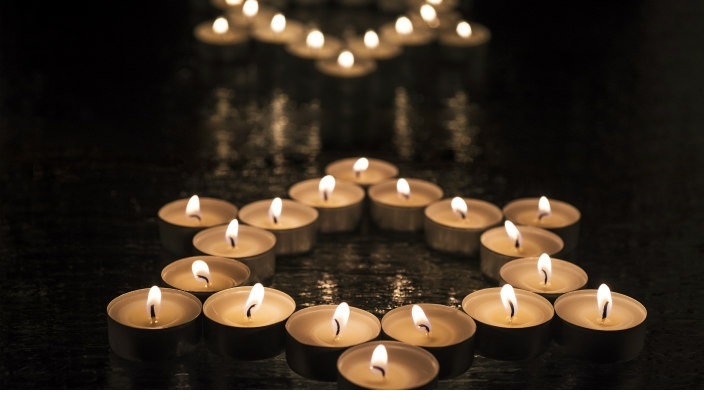click to dowload our latest edition
CLICK HERE TO SUBSCRIBE TO OUR NEWSLETTER


Published
3 years agoon
There is a new international initiative to start a family tradition on Yom Hashoah (Holocaust Memorial Day), in which families will gather to light six memorial candles and recite a pertinent poem and prayer to remember the 6 000 000.
This initiative, called “Generations light the way”, encourages families to recite the traditional mourner’s prayer, Kel Maleh Rahamim, and/or the poem, Nizkor – Let us Remember, by Holocaust survivor Abba Kovner, to impart the memory of the Shoah to the next generation. It is a collaboration between Yad Vashem and Tzohar Rabbinical Association.
“Today, we find ourselves at a crossroads,” said acting Yad Vashem chairperson Ronen Plot. “As the last generation to be personally acquainted with Holocaust survivors, we have a great responsibility to ensure that what we saw, what we heard, and what we learned is passed on to future generations.”
“The Shoah shows us how important every Jew is,” said Rabbi David Stav, the founder and director of Tzohar Rabbinical Association. He recalled an incident when an entire unit of Nazi soldiers stayed on a small Greek island for more than two weeks just to find one Jewish family.
“We need to realise how precious a Jewish life is. So much of our history has been forgotten. From the crusades to the pogroms of 1648 to 1649, to the Spanish Inquisition,” he said.
“We cannot let that happen with the Holocaust. It’s not just because the Holocaust is recent history, it’s important to remember because it teaches us that it doesn’t matter how you label yourself, we are all am echad (one people).”
Tali Nates, the director of the Johannesburg Holocaust & Genocide Centre, agrees. “We need to be aware of the past and how evil is allowed to grow if we hope to prevent more atrocities. And we need to recognise it quicker,” she said.
“The radicalisation of Nazi Germany didn’t happen in a vacuum. The world was facing an unprecedented economic crisis. Europe was still picking up the pieces of World War I. People were suffering and looking for easy answers to difficult questions. Extremism is born out of crisis.
“When people are suffering, they start looking for someone to blame. More often than not, blame falls on the Jews,” said Nates. “Today, we face another unprecedented world crisis. COVID-19 has turned the world upside down. We are facing a global economic and health crisis that we have never seen before. Again, born out of this crisis, we are seeing an alarming growth of extremism around the world. The open rise of nationalism and white supremacy is now leading to an increase in violence against those that look and sound different.”
Nates said there were many lessons to take from the Holocaust. “Remembering the Shoah is so important. Starting from our young generation and going beyond just the Jewish community, to all of humanity, it has a huge educational value.
“It’s a warning for us all to be vigilant and recognise the warning signs,” she said. “When words of hate turn into discrimination, racism, xenophobia, and violence, it ends with mass murder and genocide. The first thing is education – to connect the dots and try to prevent it from happening again.
“You have to make sure you fight antisemitism, racism, and xenophobia. These are the first signs. We need to educate about the dangers of those words and actions. We need to start with ourselves, on a personal level, to be consistent when we are with our friends, family, and neighbours. We need to educate each other that racism, however casual, isn’t acceptable. And we need to be active to avoid the same mistakes made during the Holocaust and other genocides, which unfortunately are still taking place today.
“Because we are in South Africa, we should focus on how we as South Africans can remember the Holocaust,” said Nates. “I would love South Africans to spend time thinking about their own families. A lot of them come from Latvia and Lithuania, certainly they have relatives who were murdered. I would like for the Jewish community to really think about where they come from and what happened to their relatives who couldn’t come here.
“We need to try and collect those names so they won’t be lost forever. Yad Vashem has only four million out of six million names. We need to ensure the other two million names don’t become lost forever. The Johannesburg Holocaust & Genocide Centre together with the South African Jewish Board of Deputies and the Memorial & Information Centre in Mauritius have called on our communities to collect the names by sending in the names of family members that don’t have a grave. For us, that’s a start.”
Said Stav, “The only way to ensure that we pass this on to our children is to talk about it often. I speak about the Shoah with my family and community at least once a month.
“Evil doesn’t care what we look or sound like. We have passed on the torch of faith, resilience, and morality for more than 3 000 years. The story of the Holocaust is the story of the Jewish people. We have been murdered, prosecuted, and expelled from our homes. And yet, through it all, we managed to survive. We always find a way to come out stronger. Those of us who know a survivor personally have experienced this first hand. Rebirth and resilience is our story. It’s up to us to pass this torch to our children so they can continue to light the way.”
